Graham Reid | | 11 min read
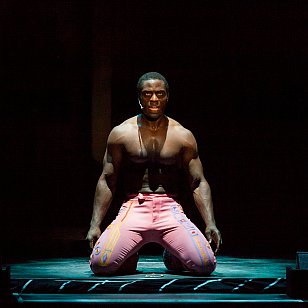
When the Nigerian military raided the compound of the outspoken activist and musician Fela Anikulapo Kuti in 1977, they beat him senseless, destroyed his famous nightclub The Shrine and threw his 82-year old mother to her death from an upstairs window.
Yet Kuti – who died of Aids-related illnesses in 97 – just kept coming back, presenting and recording his incendiary music which challenged the government, corrupt officials and, on typically lengthy pieces like International Thief Thief aka ITT – the international companies moving into Nigeria to exploit its oil reserves and economy.
Kuti's music was a blend of James Brown funk, big horns and rolling African rhythms. He is widely credited as being the creator – along with long-standing band members such as drummer Tony Allen – of Afrobeat and, as with Bob Marley in reggae, he took his unique music and politics onto the world stage.
And now his life and music is on the literal stage, because in 2009 an off-Broadway production Fela! opened on Broadway (where it picked up Tony awards) and finally went around the world, even to Fela Kuti's resurrected Shrine in a different part of Lagos which the current government turns a blind-eye to and allows to exist as a tourist attraction.
A concert version of that Broadway production – which blends music with projections of documentary excerpts to reveal the man as much as his music – comes to Auckland for the Arts Festival (dates below) and the man playing Kuti is Adesola Osakalumi, a New Yorker born for the part.
So Adesola, you actually entered the family business?
Yes, my father and brother had a dance company called the Africa 1 Dance Company and they were a company committed to retrieving a and promoting traditional African dance from all over the continent and work of that sort.
And my mother was in the company as the dance captain. So I definitely come from a family of artists who were around music, dance and culture.
I'm guessing at that time this would have been the late Sixties and early Seventies when they were doing this, that was a time when there was a renaissance of interest in Africa among black Americans.
Absolutely. My parents are West Indian, my mother from Jamaica and my father the US Virgin Island, St Thomas. That was a time when people were looking for connections to their history and ancestors and so the work flourished at that time because it was all so vibrant, culturally and artistically.
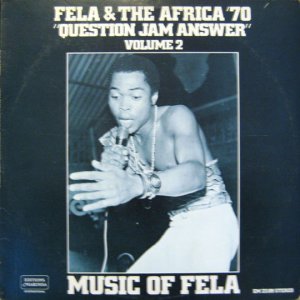 I understand they also started the
Makossa records label and distributed Fela records in the world in
the mid Seventies. I actually have some of those albums from the
time.
I understand they also started the
Makossa records label and distributed Fela records in the world in
the mid Seventies. I actually have some of those albums from the
time.
Really? Wow!
Yeah, they came in very plain covers with just a photo of Fela on the front, you remember?
When you were starting to think about Fela for the production, but did your dad and uncle speak to you about Fela, what he was like as man?
They gave me some good insights, but we didn't discuss it a lot. But definitely some things that I took away from those conversations was how committed, brash and outspoken Fela was to make the music he made, and do the work that he did as an activist.
To live the lifestyle he lead you had to have conviction and passion, and that came across very clearly in terms of how he lived his life.
You would would have grown up hearing his music around the house, but you were aware of the politics? Because it was quite dense Nigerian politics at the time. Were you aware of it, or did you have to do some reading about all that?
I was a little aware, but I wasn't as aware as I am now. But I was aware that he was talking about things that traditional r'n'b and popular music artists didn't. The content was very different. I knew there was some stuff going on that was definitely real and a little more weighty.
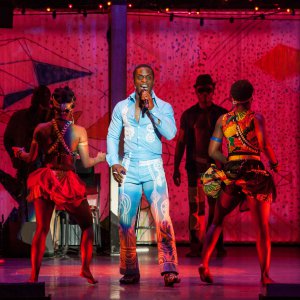 I've just realised how stupid that
question was. Because if you listen to Fela's music you are
immediately aware that it is all politics.
I've just realised how stupid that
question was. Because if you listen to Fela's music you are
immediately aware that it is all politics.
(laughs) Exactly.
You come from a dance and theatrical background, but were you ever a singer before this production?
Oh yeah, I sang a lot and was into any type of music . . . and of course rapping. That was something I did a lot although many people didn't know that I sang. I was in one of those little groups you put together with friends and your write and record songs, so that was something I had done. Clearly being part of the Fela! production brought that to the fore.
When you went for the audition what did they ask you to do?
The first audition I was just in the room with the casting director and I read a scene, the opening scene from the production, and then another smaller scene. I don't remember singing in the first audition. Maybe I did, but my first callback was a different story. There was the whole creative team and maybe two musicians from the band – the drummer and keyboard player – and there I had to sing a few verses. So the stakes were a little higher. It was nerve-wracking.
You were there for the first show on Broadway in 2009?
Yeah, I joined for the first show on Broadway although there was an off-Broadway production before that.
So you've been doing this for almost six years.
Yes, and there has been some time off between touring and it doesn't seem like that.
You went with the cast to Britain.
Oh yes, to Sadlers Wells.
Where does the Fela! story begin, because he had a long backstory before he became the Fela that people know.
The story is set one night in his club The Shrine, where he is telling his audience that he is about to leave Nigeria. Life is challenging and hard but it's time for me to go. Throughout the course of the show Fela goes back in time to various points and at the end of the show he reaffirms his belief that he will not go, but stay and do the work he felt was vital for the oppressed people of Nigeria who have to deal with unfair policies and corruption, and things of that sort.
So we go back and forth through experiences in his life. But it's all set in his club.
You've been to The Shrine of course and have performed there. I spoke to Femi about a year ago and he said The Shrine had become sort of legitimised, the government just ignoring it now because it was a tourist attraction. What is The Shrine – which is not the original one, of course -- like these days?
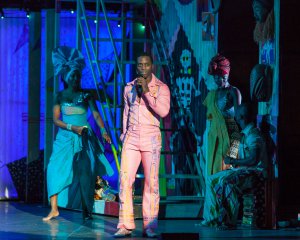 Again, in all things Fela I will defer
to Femi and the family. (Laughs) It was a nightclub with a lot of
energy. It's interesting because it's vibrant and exciting but at the
same time relaxed. There are people on one side who are just talking
and maybe playing cards, and upstairs there is a bar area where
people were just talking. The band was warming up or playing . . .
Again, in all things Fela I will defer
to Femi and the family. (Laughs) It was a nightclub with a lot of
energy. It's interesting because it's vibrant and exciting but at the
same time relaxed. There are people on one side who are just talking
and maybe playing cards, and upstairs there is a bar area where
people were just talking. The band was warming up or playing . . .
It's a really interesting place.
Of course, there is a military or police presence everywhere you go in Nigeria, although we were obviously there at night. But I didn't feel nervous or hesitant. Everyone [in the cast] just felt so honoured to be bringing the show to his home, like a full-circle moment.
Did you do the whole show in The
Shrine that night?
It was slightly modified from the one that
we did there at the Echo Centre [in Lagos]. For one thing you
couldn't put up the whole set. But they got a show and a performance.
Some people were saying 'Fela is alive'. And they were correct.
Because Femi and Seun and the family are still here and the music is
still active in the legacy.
So his music lives on.
I imagine that other than opening night on Broadway this must have an extremely nervous night for you. You are going on the stage in front of this man's real life audience.
Absolutely, for the initial Broadway run and the Nigeria show I was still in the ensemble. I became an understudy and went on a few times as Fela, but whether I was playing the role or in the ensemble it was surreal. There we were in his hometown among his own countrymen, many of whom knew him. And we went to Kalakuta, his home, and spent some time there.
That's one thing that makes this show so interesting, you are playing someone who was so beloved but who actually lived and is not just a figment of the imagination. And in his work he affected so many people, and I feel a responsibility do that role and his legacy, to portray him in very dynamic way.
It is exciting music, but what also strikes me is, sadly, how relevant some of his messages still are. His song ITT anticipated the anti-globalisation movement by more than two decades.
Absolutely. Absolutely. Anyone who is in this show would be able to tell you different favourite moments, but everyone will say it is so amazing to see how prescient he was in his music, and that's what makes the show so great and to have long appeal.
It's not necessarily a black show. It is a black show of course, an African show. But it's also a global and a human show because everyone understands oppression and can relate to an underdog, everyone can relate to a person standing up for what he believes in, in the face of opposition. That in my opinion is just as potent and powerful as where he came from and his background.
That's why people who are not familiar with his music will go to the show not knowing anything about this man but then go and do some research and come back and look at it through more informed eyes.
The majority of music tends to be relationship-based and in the West it is commercial. But here's a man who turned down many opportunities to relocate from Nigeria and probably live a much more comfortable life. But he turned those offers down and remained a man of the people . . . and there's something to be said about that.
In many ways he was a heroic figure, but does the show deal with some of the less savory aspects of what he said? He made many very blunt anti-gay statements for example.
Yes, he did. The show doesn't go into those things. I think there was a decision made early on that. Bill T. Jones our original choreographer and director, who is gay . . . I presume they made choices about how much of the story they could tell, and the length of the story too. I heard the off-Broadway version was a little over three hours when it first started and that's just not going to work in terms of Broadway theatre storytelling.
I think they cut some things out. But I believe you can go to the show and see he had a lot of layers. He was charming and charismatic, but he was also volatile and aggressive. So I don't think the things that are not in the show was because they were trying to sanitize him, I think the choices were made by the creative team to do a show that was entertaining, that was not just his ups and downs but the grey part of him.
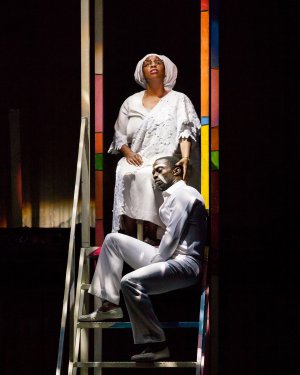 But also talk about what happened
with his mother and the raid.
But also talk about what happened
with his mother and the raid.
I remember Seun in an interview being asked how that affected him seeing that in the show, and him saying, 'How would you expect to to affect me?' It was very difficult for him to watch.
I know there have been comments to purely sanitize Fela and I understand that position. But I think we do a good portion of who the man is. And the Broadway version ends with that scene of Fela taking off his mother's coffin.
A full Fela show would be 10 hours. Every song could be 45 minutes..
You are very busy with this show, but I wonder what effect this has had on you personally . . . because you were doing teaching and also choreography for other people. Has that part of your life had to be put on hold largely because of the demands of Fela! ?
To an extent, but I've always been a performer and acting was something I knew I would do. So for me it's a good progression in term of being able to be on stage singing and acting, using all of my abilities in one place.
At the same time, there have been other projects I've been able to do and were dance related, international teaching and judging competitions. So I feel that anything that's been put aside has only been so temporary and as an artist I'm interested in exploring different sides of what I can do.
Fela! has been nothing but a good opportunity. I was dancing in the show also, so I was getting to do everything.
When you you look down the track you will be doing this for the foreseeable future? Or is there an end date?
I'm not certain what the timeframe will be, and I know there is a lot of talk about this going a lot further.
If that happens I'd more than interested in being a part of it. But at the same time you never know if another opportunity or role might come up. So I'm going to take it as it comes.
Someone might say, “Hey, you want to do this James Brown production?'
(laughs) Exactly.
Fela! The Concert: Civic Theatre, Auckland. March 19 2015 review
As befits the roiling music and oversized personality of the Nigerian pan-African political lightning rod and creator of Afrobeat, the late Fela Anikulapo Kuti, this 90 minute, stripped-down version of the award-winning Broadway musical Fela! is built large: 18 performers on stage (not including singer-narrator Adesola Osakalumi as Fela), and three are percussion players.
This vigorous production is a narrow-focus musical sketch of Fela's extraordinary life – incendiary and confrontational politics coupled with powerfully rhythmic, lyrically educative music – which comes with physicality, sexuality and sensuality in its dance, and a punch from the bottom through the driving percussion.
The man who rightly claimed “music is the weapon” is not fleshed out however because of the limitations of the reductive treatment, and the sheer complexity of his personality.
Fela! The Concert is therefore an enjoyable musical and a useful introduction to a firebrand whose stand against corruption, politicians, international corporations and the military from the 70s until his death in 97 seems remarkable in an age when political engagement can be reduced to a tweet or on-line petition.
The storyline sketches in his politicisation (notably Black Panther politics of the late 60s) and in song after song – some with surtitles – we hear him call out his targets to the driving music he created. Osakalumi is a strong, central stage presence if not possessing quite the commanding voice required to convey the inner fury of Fela's character (who appears to speak for himself in period footage). The disciplined music and exceptional dancers carry the lesser moments, the staging, delivery and back-projections make Zombie and ITT compelling, and singer Ismael Kouyate – who possesses the cut-through power of Salif Keita and doesn't require a microphone – is outstanding among the engaging cast.
Against the backdrop of flames and turmoil they give an excellent account of the pivotal song Sorrow Tears and Blood which Fela wrote after the Nigerian military raided his compound in Lagos, destroyed it, raped and beat the occupants, and arrested him. What is only alluded to – and given the prominence of his influential, supportive mother and early Nigerian feminist Funmilayo in his life, and here in the early part of the production – is that Funmilayo died as a result of the incident. That seems an opportunity lost to add emotional depth.
Being a distillation of the Broadway production, Fela! The Concert can only scrape the surface of Fela's politics and personality – who goes to the theatre for a political education these days anyway? – but is a powerful conversation starter and a thoroughly enjoyable, professional theatrical production which understandably drew the opening night audience to its feet.

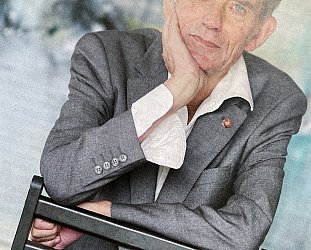
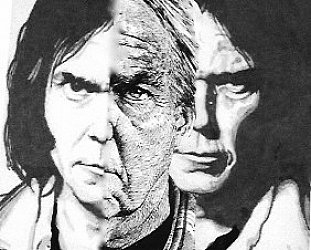
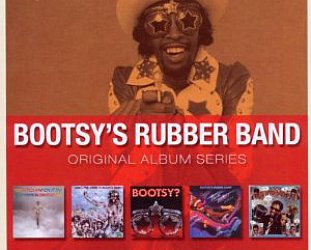
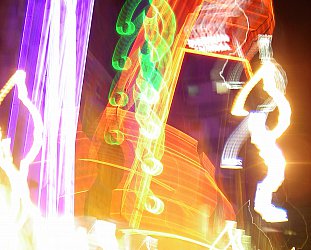
post a comment